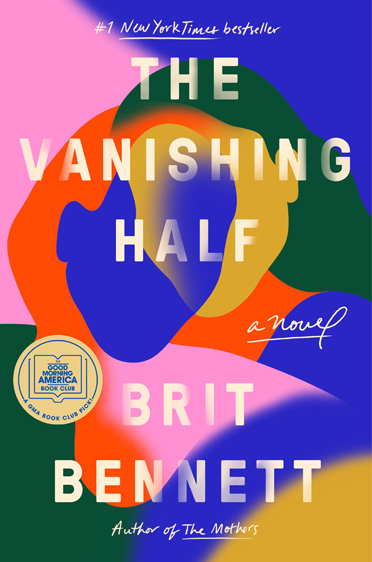-
March 17, 2021
Opening Round
-
Brit Bennett
1The Vanishing Half
v.
3Red PillHari Kunzru
-
Judged by
M.C. Mah
Both of these books are for dilettantes, wounded animals subscribed to a dead form, who read what others make up, wish to be told how to be, and have nothing but time to kill and a vampiric sense of their own identity. I liked them both.
A reader is pulled along by the title of Red Pill, waiting to see what it will rip from the headlines. Our man in the Berlin suburb of Wannsee has gotten a fellowship at the Deuter Center. He’s a writer, and Kunzru’s depiction of his midlist oeuvre (“a book about taste”) is fairly immaculate. Not to mention boring. Writers are impossible to represent, even on the page; their genius, if that, expresses itself with maximum obliqueness in their everyday lives. Singers sing; writers struggle to quit cigarettes.
But Red Pill commits to the bit. What follows is a hundred pages where our protagonist complains about the open-office plan, quotes Adorno, and feels increasingly out of sorts and paranoid about the Center’s data collection. “I became slightly self-conscious about the way I was eating.” Well, if it makes you feel any better, I didn’t notice.
Oddly enough, Red Pill tends to paraphrase life online. He worries that his monitor faces his co-fellows and will reveal him “browsing the internet.” He masturbates with downloaded pictures. “I was invited to prove that I was not a robot. Luckily for me the bar was low.” Photographs with or without crosswalks are left to our imagination.
No basketball box scores, no left-schism Twitter, no video clips of women in those black bodysuits that denote “secret agent.” Red Pill doesn’t even compare social media to lying unconscious in a tube full of conductive nutrient slime. The whole novel is something of a late adopter. To the point, our protagonist is not, to my understanding, red-pilled. In an oversight, the book does not feature an ex-supplements salesman with a self-published book on the lost art of manliness storming the Capitol. Perhaps a plot involving a New York Times op-ed columnist with their feet on an ottoman deleting “identity politics” and going with “identitarian” is insufficiently novelistic.
But then his life is turned upside down by a TV show he finds compelling but overrated. This is the way.
It’s a cop show on an alt-reality HBO Max called Blue Lives. When he meets Anton, the showrunner, and asks him why the show must be so nihilistic and violent, he gets the Col. Jessup speech from A Few Good Men. “Don’t be a pussy,” Anton says, winning the argument, naturally.
Red Pill is, in the end, a bizarrely tendentious, disciplined book. Anton tells him not to take his lite Nazism too seriously—taking things too seriously being the cardinal sin of the guilty liberal. The book is kind of like The Stranger, but rather than depicting a man in a profound state of alienation, it’s about a guy who kinda sucks in that pompous manner most all of us adopt whenever we sign on.
A middle section about an East German punk rocker is the most affecting and human (and the least stream of consciousness), though it also feels like a comment on the oft-made analogy. Monika joins a band—a subculture of note for the local secret police. The Stasi is in “the fabric of things,” which is a quotation from the Harper’s Letter, I believe. Things seem to have moved in her apartment. “Each time she felt sure of what was happening, she came up against the simple fact of its absurdity. Why would they go to such trouble, just to play petty pranks?” Why would anybody? One would have to think, am I the asshole?
Like it or not, only one climax is possible: a pitiless account of watching televised election results on the night of Nov. 8, 2016. Did that night constitute a red-pilling of half a country? “[N]ormality is a paper screen over something bloody and atavistic that is rising up out of history to meet us.” Or was the election the result of an overprescribing of red pills in Pennsylvania and the Upper Midwest? (The recount is ongoing.) Disturbed by his breakdown, all his wife can say is, Tell me something true, which is what I’ve been asking for ever since that night with no expectation that anyone will be able to do it, or even come close. The Capitol riots have reiterated the motley assertions as to the origin story of the Trump voters: exurban rage and jokey instigation, their internet rabbit holes given away by a rhetoric of ruthless juvenilia. It must be said that they are overwhelmingly white, or, say, “badly & unfairly treated for so long.” Red Pill is its own rather particular version of this story. It seems to be a novel written in “good faith,” told with a straight face, at a time when the sincere appear insane. The moral of the story is the worst thing you can do is tell yourself you’re going to work and then watch prestige TV. That’s how it starts. That’s how they get you.
* * *
The Vanishing Half begins in Mallard, La., where “nobody married dark.” It is a fable of a town, unmapped, unlike the novel itself, which is mapped quite well. The twins, Desiree and Stella (one wild, one square), run away at 16. “Stella became white and Desiree married the darkest man she could find.” The novel begins with Desiree returning to Mallard with Jude, her daughter with dark skin. Stella is at long last rediscovered in Los Angeles with her own daughter, fair and blond.
There’s a full range of Note Books and related stationery products at fieldnotesbrand.com. Field Notes is proud to once again be a sponsor of the Tournament of Books.
The book is both itself a melodrama and a corrective of “passing” narratives wherein that sin is paid for in tragedy. There’s little intended suspense about whether Stella will be found out; instead, the question is why she “decided to become someone else.” The search for Stella is a job taken on by Early, the bail bondsman, before the mantle is passed to Jude. After all, why should Desiree return and Stella vanish? “Only white folks got the freedom to hate home”—a sterling epigram just this side of probably almost true.
The search comes up empty until the novel lets Stella speak for herself. She lives in Brentwood, having married the boss at the company that first mistook her for white. The gossip is that a Black couple has bought the house across the street, and Stella gathers the courage to say what everyone is thinking—there goes the neighborhood. Remembering her manners, she begins a doomed friendship with sophisticated Loretta, a woman as bold as Desiree. These pages are some of the book’s best and saddest for being something of an anticlimax. After so much pining after Stella’s reasoning, it is made awfully plain by her daily grinding subterfuge.
The Vanishing Half spans generations, speaks through a dozen characters, and at no point feels false, or in anything but good crafting hands. However, this plot-driving Why? is overly narrated. “But sometimes lying was an act of love.” Perhaps. “She could tell the truth, she thought, but there was no single truth anymore.” And yet the novel seems to look for one. By the end, a truth that stands out—despite being given little narrative ceremony—is Desiree’s reason for leaving Mallard in the first place: because she wanted to.
Reunions and confrontations begin with a chance encounter between Jude, a runner at UCLA, and Stella’s lily-white daughter, Kennedy—an aspiring actress but already a big personality. Not quite family and not at all friends, their connection is described nicely as “like holding a finger to another’s wrist to feel for a pulse.”
Kennedy peaks as an actress in a daytime soap. A litany of her roles is written with an anomalous verve:
An incomplete list of characters she played in the soap world before landing Pacific Cove: a conniving candy striper who steals a baby; a teacher who seduces her student’s father; a stewardess who spills water on the lead, maybe accidentally, maybe intentionally, the script was unclear; the mayor’s daughter who gets seduced by the show rogue; a nurse who gets strangled in a car; a florist who hands the star a rose; a stewardess who survives a plane crash to later be strangled in a car.
To Kennedy, self-invention is a soap opera. Stella “passes over” and loses herself. Jude’s boyfriend, Reese, saves up for top surgery.
Though the story turns on it, the very question of being and performance starts to turn to dust. “They were chasing the past, searching for Stella down streets and stairwells and alleyways.” This Stella is a blood-simple idea, someone who can decide to be someone else if only she betrays the person she was. Reese becomes the person he’s always known himself to be. The idea of self-invention is treated as profound and definitive, a trauma or a reveal, and not for a moment as banal—the busywork of the conscience—or unfixed, given to a vital uncertainty. For this reader there was as much suspense in finding out why the characters did what they did as there was with seeing who would find the question unanswerable. Why did you leave? Who have you become? Not all of us are supposed to know.
Identity makes something of a square peg as The Vanishing Half tries to say something both wise and storyboardable. Where it bestows upon its characters an unnecessary purposefulness, Red Pill revels in triviality. Both books attempt a sweeping, historical truth, but only one portrays the descent into human podcast. The Vanishing Half is an accomplishment, Red Pill a screed. I would not go so far to say that one is more necessary than the other right now; I only know which one spoke to me with the consistent note of apology that it could be wrong.
One thing the post-2016 years have taught us is that we are not meant to comprehend revelation; be wary of those who experience the real world all of a sudden, as if it were previously hidden by forces they couldn’t be bothered to understand or check to see if they actually existed.
Think not of what your country can do for you. Take the blue pill.
Match Commentary
By Javier Garcia del Moral Diaz de Cerio & Andrew Womack
Andrew Womack: As you know, throughout this year’s Tournament we’re inviting independent booksellers in the commentary booth. And today we’re joined by Javier Garcia del Moral Diaz de Cerio of The Wild Detectives in Dallas. Welcome, Javier! Please tell us where you’re at and what you do.
Javier Garcia del Moral Diaz de Cerio: Hi Andrew, I’m in Dallas at the moment, just returned from Spain after a month and a half over there. I direct the bookstore, program the events, select the book titles, and manage the day-to-day operations.
Andrew: Can you tell us more about The Wild Detectives?
Javier: We have a team of seven people. Our bookstore is a little peculiar, it has a bar and a stage, we do all kinds of events, not only literary but also related to music, theater, and other disciplines. For some people The Wild Detectives is a bookstore with a bar, for others it’s a bar with a bookstore, and for others it’s a venue to see events.
Andrew: And related to that, I know you’ve been doing online events recently. Do you miss the in-person experience?
Javier: Certainly, one of the main drivers of the events we organize at the bookstore is to bring people under the same roof, expose them to something, and see what happens. Those are the nights when people can exchange thoughts and impressions, when the interesting conversations happen and when curious people meet those others that help them to go that step further.
Andrew: I miss it for sure. OK, so let’s get into it. Were you persuaded by the judge today?
Javier: I think I was; both books talk about existentialism in some way. Anyone interested in that knows that a book that could be unbearable at some point in life could be just the opposite in a different moment. I feel like the judge just picked the title that spoke to him the most in this particular time.
Andrew: It’s certainly a particular time, and admittedly, I’ve been avoiding Red Pill for perhaps just that reason. Maybe it’s just, for me, that it’s too much of this moment, at this moment. But this line of Judge Mah’s makes me feel differently: “Both books attempt a sweeping, historical truth, but only one portrays the descent into human podcast.” Where I think it’s easy to get so caught up and overwhelmed by the news, I think it’s important to dig into what’s making humans do what they’re doing at this moment. What do you think?
Javier: I fully agree, I think we all like to understand why people do things or act in a certain way, but I also believe they are all very worried about how other people are behaving, and not so much about why we are acting a certain way. I feel like the past few years have been a little overwhelming in terms of literature explaining or trying to understand why part of the population behaves in a particular way, and always treating them like a different group.
Andrew: Maybe too much gawking?
Javier: Well, looking at the amount of people acting in such unexplainable ways, it looks to me that we are not all that different from each other, and we, individually, are not that far from acting in a way unexplainable to us just months before. Maybe the exercise needs to go in the opposite direction, to the self rather than the others. That being said, I think the ideas portrayed in both books can help to do some sort of self-assessment.
Andrew: So let me ask, what do you like to read—both typically and in these strange times?
Javier: I read mostly contemporary fiction, although these past years have made it a little more difficult. I felt like I must read more nonfiction than usual to try to make sense of what was going on in the world. But I think I still prefer fiction for that. I also read a lot in Spanish, mainly from Latin American authors.
Andrew: Any recommendations of translations for our readers?
Javier: Of course. Over the last few months there have been a good number of amazing books translated into English: Hurricane Season by Fernanda Melchor, Eartheater by Dolores Reyes, Ornamental by Juan Cárdenas, I Don’t Expect Anyone to Believe Me by Juan Pablo Villalobos, and Four by Four by Sara Mesa.
Andrew: And finally, how has bookselling been different for you during the pandemic?
Javier: Well, the biggest and most obvious difference has been the format, we now sell a lot more online than we used to. As usual it has pros and cons. On the one hand you can fulfill almost any request, on the other hand that kind of defeats the purpose of a bookstore like ours, where curation is so important and where we try to seduce readers into books that otherwise could go unnoticed.
I feel good about the months ahead. The weather is starting to get a little better, the vaccines are rolling out, and people are missing things that they took for granted, like going to a bookstore to buy a book and talk literature with a stranger.
Andrew: I look forward to visiting next time I’m up your way. Thank you for your time today, Javier!
New 2021 Tournament of Books merch is now available at the TMN Store. As a reminder, Sustaining Members receive 50 percent off everything in our store. To find out why we’re asking for your support and how you can become a Sustaining Member, please visit our Membership page. Thank you.
Welcome to the Commentariat
Population: You
To keep our comments section as inclusive as possible for the book-loving public, please follow the guidelines below. We reserve the right to delete inappropriate or abusive comments, such as ad hominem attacks. We ban users who repeatedly post inappropriate comments.
- Criticize ideas, not people. Divisiveness can be a result of debates over things we truly care about; err on the side of being generous. Let’s talk and debate and gnash our book-chewing teeth with love and respect for the Rooster community, judges, authors, commentators, and commenters alike.
- If you’re uninterested in a line of discussion from an individual user, you can privately block them within Disqus to hide their comments (though they’ll still see your posts).
- While it’s not required, you can use the Disqus <spoiler> tag to hide book details that may spoil the reading experience for others, e.g., “<spoiler>Dumbledore dies.<spoiler>”
- We all feel passionately about fiction, but “you’re an idiot if you loved/hated this book that I hated/loved” isn't an argument—it’s just rude. Take a breath.




